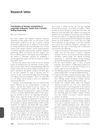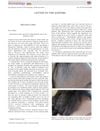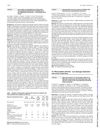 12 citations,
January 2021 in “Drugs in R&D”
12 citations,
January 2021 in “Drugs in R&D” Isotretinoin is effective for treating dissecting cellulitis, but recurrence is common.
 12 citations,
June 2020 in “Dermatology and therapy”
12 citations,
June 2020 in “Dermatology and therapy” Platelet-Rich Plasma (PRP) can promote new hair growth and increase hair density, but its effectiveness varies depending on the type of hair loss.
 11 citations,
May 2000 in “International Journal of Dermatology”
11 citations,
May 2000 in “International Journal of Dermatology” Taking a small dose of prednisone before menstruation can almost completely prevent premenstrual acne with few side effects.
 10 citations,
February 2011 in “Journal der Deutschen Dermatologischen Gesellschaft”
10 citations,
February 2011 in “Journal der Deutschen Dermatologischen Gesellschaft” The document concludes that proper diagnosis and evidence-based treatments are crucial for managing hair diseases, and psychological support for patients is important.
 8 citations,
August 2018 in “International Journal of Dermatology”
8 citations,
August 2018 in “International Journal of Dermatology” The document concludes that doctors should carefully consider off-label drug use in dermatology and always inform patients, while more research is needed on the safety and effectiveness of such practices.
 7 citations,
April 2021 in “Dermatology and Therapy”
7 citations,
April 2021 in “Dermatology and Therapy” H-1 antihistamines may help with various skin conditions, but more research is needed to confirm their effectiveness.
 6 citations,
January 2012 in “Journal of Biomedicine and Biotechnology”
6 citations,
January 2012 in “Journal of Biomedicine and Biotechnology” Ustekinumab might work for severe psoriasis, but more research is needed to be sure.
 5 citations,
February 2021 in “Dermatology and Therapy”
5 citations,
February 2021 in “Dermatology and Therapy” Platelet-rich plasma mesotherapy improved symptoms in patients with corticosteroid-induced rosacea-like dermatitis.
 5 citations,
August 2015 in “British journal of dermatology/British journal of dermatology, Supplement”
5 citations,
August 2015 in “British journal of dermatology/British journal of dermatology, Supplement” The top research priorities for congenital ichthyosis include long-term side effects of oral retinoids, best topical treatments, and treatments for itch and hair loss.
 5 citations,
January 2009
5 citations,
January 2009 Betamethasone is more effective than Tacrolimus and soft paraffin for hair regrowth in patchy alopecia areata.
 5 citations,
July 2006 in “Contact dermatitis”
5 citations,
July 2006 in “Contact dermatitis” Ammonium bisulfite in hair bleach can cause facial eczema.
 4 citations,
November 2020 in “Psoriasis : Targets and Therapy”
4 citations,
November 2020 in “Psoriasis : Targets and Therapy” The document concludes that proper treatment and management of plaque psoriasis in adolescents can improve their quality of life.

research Acne
4 citations,
January 2019 Acne is a common skin condition that can be influenced by diet, lifestyle, and hormones, and requires a treatment approach that includes psychological considerations.
 3 citations,
July 2018 in “Biomedicine & pharmacotherapy”
3 citations,
July 2018 in “Biomedicine & pharmacotherapy” Paeoniflorin protects brain cells by involving a specific protein and neurosteroids.
 3 citations,
June 2018 in “Australasian journal of dermatology”
3 citations,
June 2018 in “Australasian journal of dermatology” Eight people with severe hair loss grew their hair back naturally.
 2 citations,
April 2021 in “International Journal of Pharmaceutics”
2 citations,
April 2021 in “International Journal of Pharmaceutics” Serum formulations were better at delivering molecules to the hair bulb than nanoparticles.
 1 citations,
October 2023 in “Dermatology and therapy”
1 citations,
October 2023 in “Dermatology and therapy” Some treatments for severe hair loss work but often have side effects, with baricitinib showing the most promise.
 1 citations,
October 2023 in “Clinical, cosmetic and investigational dermatology”
1 citations,
October 2023 in “Clinical, cosmetic and investigational dermatology” Traditional treatment for pediatric alopecia areata is most effective and should be first choice.
 1 citations,
June 2020 in “Annals of the rheumatic diseases”
1 citations,
June 2020 in “Annals of the rheumatic diseases” Most patients successfully switched from the original adalimumab to a biosimilar with few reverting due to reduced effectiveness or side effects.
 1 citations,
March 2010 in “Internal medicine journal”
1 citations,
March 2010 in “Internal medicine journal” A 72-year-old man with sudden taste issues and hair growth was diagnosed with a severe stomach cancer and died within 5 months.
 April 2024 in “Dermatology and therapy”
April 2024 in “Dermatology and therapy” There are significant gaps and inconsistencies in diagnosing and treating alopecia areata in Greece and Italy.
 August 2022 in “Acta dermato-venereologica”
August 2022 in “Acta dermato-venereologica” Propylthiouracil can cause hair loss, reduced sweating, and nail issues, but stopping the drug can reverse hair and nail problems.
 June 2018 in “Disease-a-Month”
June 2018 in “Disease-a-Month” Remove inflamed cysts surgically, avoid topical antibiotics on wounds, treat skin and mouth conditions with specific medications, and address underlying causes of hair loss.
 December 2016 in “Springer eBooks”
December 2016 in “Springer eBooks” Chrousos Syndrome is caused by mutations that make the body less sensitive to glucocorticoids, leading to various symptoms and requiring high-dose treatment.
 January 2016 in “Journal of The Korean Medical Association”
January 2016 in “Journal of The Korean Medical Association” The document says how to diagnose and treat hair loss from alopecia areata, but there's no cure and treatments vary.
 July 2015 in “Actas Dermo-Sifiliográficas”
July 2015 in “Actas Dermo-Sifiliográficas” A woman experienced excessive hair growth after using a hair loss treatment with minoxidil.

Chemicals and stem cells combined have advanced regenerative medicine with few safety concerns, focusing on improving techniques and treatment effectiveness.
 January 2012 in “Elsevier eBooks”
January 2012 in “Elsevier eBooks” Hair loss can cause emotional and social issues, and various treatments, including medication, surgery, and psychological support, are needed.
 January 2007 in “Elsevier eBooks”
January 2007 in “Elsevier eBooks” Alopecia areata is a reversible, autoimmune-related hair loss that can have significant emotional impact and uncertain treatment effectiveness.
 January 2003 in “Steinkopff eBooks”
January 2003 in “Steinkopff eBooks” Alopecia Areata is a hair loss condition affecting all genders, often linked to other diseases, with treatments available but varying success rates.






























